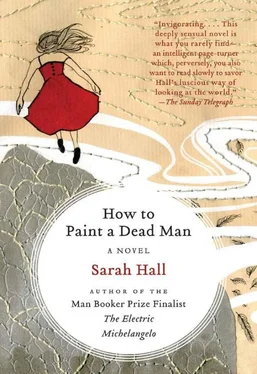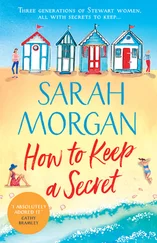Sarah Hall - How to Paint a Dead Man
Здесь есть возможность читать онлайн «Sarah Hall - How to Paint a Dead Man» весь текст электронной книги совершенно бесплатно (целиком полную версию без сокращений). В некоторых случаях можно слушать аудио, скачать через торрент в формате fb2 и присутствует краткое содержание. Год выпуска: 2009, Издательство: Harper Perennial, Жанр: Современная проза, на английском языке. Описание произведения, (предисловие) а так же отзывы посетителей доступны на портале библиотеки ЛибКат.
- Название:How to Paint a Dead Man
- Автор:
- Издательство:Harper Perennial
- Жанр:
- Год:2009
- ISBN:нет данных
- Рейтинг книги:4 / 5. Голосов: 1
-
Избранное:Добавить в избранное
- Отзывы:
-
Ваша оценка:
- 80
- 1
- 2
- 3
- 4
- 5
How to Paint a Dead Man: краткое содержание, описание и аннотация
Предлагаем к чтению аннотацию, описание, краткое содержание или предисловие (зависит от того, что написал сам автор книги «How to Paint a Dead Man»). Если вы не нашли необходимую информацию о книге — напишите в комментариях, мы постараемся отыскать её.
, Sarah Hall, "one of the most significant and exciting of Britain's young novelists" (
), delivers "a maddeningly enticing read... an amazing feat of literary engineering" (
).
How to Paint a Dead Man — читать онлайн бесплатно полную книгу (весь текст) целиком
Ниже представлен текст книги, разбитый по страницам. Система сохранения места последней прочитанной страницы, позволяет с удобством читать онлайн бесплатно книгу «How to Paint a Dead Man», без необходимости каждый раз заново искать на чём Вы остановились. Поставьте закладку, и сможете в любой момент перейти на страницу, на которой закончили чтение.
Интервал:
Закладка:
Each day you walk into the gallery alert to the possibility of discovery, sure a reckoning of some kind awaits you. You will have left a mark on him, unmistakably congressional, or she will find something incriminating in his pocket, a book of matches from the hotel, a phone bill, your earring. She will smell the sex on his clothing, the salt and ammonia. You hold your breath, hang up your coat, turn on the computer, slide open a window. When you leave one room and enter another the hairs on your arms and neck rise. You know discovery could happen at any moment.
And you know there will be no forgiveness for this atrocity. Life does not work that way, in love, in betrayal. There is always hurt, directed exactly into the central chamber of the heart. This is the worst possible scenario. You imagine her walking in on you as you press against him. You picture the disbelief on her face. No, it isn’t true, it couldn’t possibly be. Say you haven’t. You picture her striking you, leaving a gash under your eye from the tall stone of her engagement ring. You think of her distraught, hunched over with the baby in her arms, her hand covering the fontanelle, the skin there delicately beating. And her phone calls to Nathan — torrid discussions where they become bitter comrades. How could she do it? Because of her brother. No. The bitch has no excuse.
You will have no defence. You imagine Nathan’s torment. Nathan, who does not deserve such treatment, who knew straight away he wanted to marry you, and hung in when you said no. Nathan, who is kind and considerate, whose proximity has transposed, inexplicably, into something not precious enough for you to cherish.
The grisly cinema plays through your head. You catch Angela watching you, and you hold your breath. Are you OK, Susan? she asks. You look a little queasy. Are you feeling sick? Oh darling, I do wish I could help you feel better through all this. It’s perverse, but you wonder, just for a second, whether she knows everything and it does not matter, whether she has, during this time of catastrophic loss and descent, generously loaned you her husband.
You try to concentrate on preparing the exhibition space. The maple floors have been polished to a gleam, the walls whitened. The artefacts have at last begun to arrive, delivered by courier, and accompanied by their verification certificates. Carefully, you’ve investigated the containers, delving down through polystyrene chips for the frail, bandaged lumps. You gently lifted them out, each one, and unbound the strips of cotton wool and tape. And there, in your hands, were the relics of the great artists who have always been in your life, in your father’s books, in his stories and boasts, in the lecture halls and essays, and in your own early compositions. A crippled man’s bed slippers. A Russian violin. Eyeglasses. There was an almost electric charge to each item, a faint pulse, perhaps your own, or perhaps just the poignancy of knowing to whom they had belonged, and by whom they had been used.
There you were, holding the damaged leather case that had held those corrective spectacles. There you were, unzipping the pouch and removing the hinged frame with its one chipped lens, its wire ear hooks. And, quite unexpectedly, you were moved. You phoned your dad. The phone rang in the house and the answering machine clicked on. Then you remembered he had a doctor’s appointment. You set the glasses on the white column, the wire arms folded, the frame leaning against the case. Next to it you put your father’s bottle.
It’s now apparent that In the Artist’s Shoes is going to be a success. Already there are media requests, the culture shows have booked airtime, the guest list for the preview is full, and, looking about at these curious little artefacts, you know people will come to see them, and they will be intrigued. They will connect the historical dots; give each item importance. They will recognise these familiar items not just as precursors to their modern-day cousins — smaller, denser, bolted and pinned, sprung and stitched, unmistakably crafted — but as vital salvage, things that have been touched by genius, preserved by families and servants, and saved by museums. In them they will recognise their own humanity, just as you have. And it will astound them that a human being, such as they are-short-sighted, overweight, weak-boned, an addict-could produce those definitive works of art. You were wrong to ever doubt the idea.
The chattels suit the domestic interior of Borwood House. It is the best exhibition yet, and will be personal, and intimate. Nothing will be encased under glass. You are affixing signs to the walls. Many of these items are delicate. Please do not touch. You think about Danny and his metal angel, the sound of her ringing through the V&A, and you know that human nature is an innately contrary thing. People will always touch that which is forbidden.
You went to their wedding, however many years ago it was. About the same time you were hooking up with Nathan actually. The ceremony was in a little blond church in Suffolk, in a well-kempt village with nodding rose bushes and thatched roofs: Angela’s old territory. You were too busy with Nathan to care much about what was happening. You remember drifting about the village the day before the ceremony, having a drink in the pub early, feeling tipsy and a little sore from the prolonged, exploratory sex at the bed-and-breakfast. You barely knew Tom. He was handsome, dark, almost forty. Angela seemed smitten with her Italian writer. The next day, in the church, he showed you to your seat. He shook hands with Nathan and held up a palm to you. He was wearing a three-piece graphite suit, a pink cravat, a pink flower in his lapel. His hair was cut in military style. The groom’s side of the church was thinly occupied. There were some friends from the publishing world, including a well-known author, and one ancient, weeping aunt who spoke no English, and looked far too frail to have travelled from the continent. She remained in the church while everyone else went to the reception.
He was, more or less, a stranger. You had talked pleasantly a few times in smoky moments of privacy at events and parties, and from end-table chairs at restaurants. There was no obvious attraction, though he was good-looking and quietly sociable. He talked interestingly about translation, the marvel of the apostrophe. Later, when you were renovating the gallery, he told you some stories about his mother, about how she would go to the local bookshop and black out any swear words she could find in the texts. He laughed and said she was mad, that she used to write letters to women in prison asking them to repent. Then he sighed and said she was probably just depressed, but he had had to get out of there. He said the family was unlucky. And you felt as if this was an intimate conversation to be having.
You were stripping the old wallpaper together with a steamer, peeling it away in great damp bolts from skirting board to ceiling. His T-shirt and jeans were flecked with paint. When you got to the small snug room at the back of the building, he said, We should leave this paper in here, the condition is excellent.
While you were decorating the two of you accidentally disturbed a wasps’ nest that had been built behind one of the old window shutters. It was a hot summer. The windows were open and one or two wasps had been drilling about the place. Then Tom found the grey, cindery pocket in a wall cavity, and, thinking it was disused, he began to chip between its seal and the plaster. Suddenly the air was swarming. For a moment he was paralysed as the insects rushed and scribbled above the nest. Gesù Cristo! He picked up a decorating sheet, threw it over the two of you, and you stumbled from the room, slamming the door closed. Are you stung? No. Nor am I . Underneath the sheet he smelled of sweat and dust. You could hear the wasps as they flew against the other side of the door, rapping softly like fingertips.
Читать дальшеИнтервал:
Закладка:
Похожие книги на «How to Paint a Dead Man»
Представляем Вашему вниманию похожие книги на «How to Paint a Dead Man» списком для выбора. Мы отобрали схожую по названию и смыслу литературу в надежде предоставить читателям больше вариантов отыскать новые, интересные, ещё непрочитанные произведения.
Обсуждение, отзывы о книге «How to Paint a Dead Man» и просто собственные мнения читателей. Оставьте ваши комментарии, напишите, что Вы думаете о произведении, его смысле или главных героях. Укажите что конкретно понравилось, а что нет, и почему Вы так считаете.












